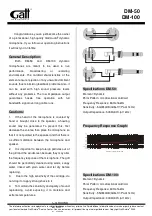
Learn more at www.dpamicrophones.com
Fig. 1. 4080 Miniature Cardioid Microphone, Lavalier
Fig. 2. 4080 mounting solution
Fig. 4. Loop between holder and clip
Fig. 3. Loop between microphone and holder
Fig. 8. 4080 mounted right
Fig. 6. Placement 20-25 cm
(8 – 10 in)
from mouth
Fig. 7. 4080 mounted left
Fig. 5. Securing
the cable with the cable clamp
Fig. 9. Tightening the MicroDot connector
Miniature Cardioid Microphone, Lavalier
Introduction
The DPA 4080 Miniature Cardioid Microphone, Lavalier, is
specifically developed to provide optimum speech intel-
ligibility within broadcast, conference, and other live perfor-
mances in the studio. To ensure optimal performance with
your 4080, please follow these simple instructions for use,
placement, and cleaning.
Correct use of 4080
The 4080 is designed to be mounted on the body of
a speaker. It is acoustically pre-equalized, offering a 4 dB
presence boost, which makes the voice more distinguish-
able and improves speech intelligibility and definition.
The 4080 is delivered with a pre-mounted pop-filter in
a durable holder with an integrated shock mount, fixed
on the DPA clip (fig. 1). The 4080 is designed to be
always used in this setup and it is recommended not
to dismount it when not in use. If necesssary, the holder
can easily be mounted or dismounted from the clip (fig.
2). When mounting the holder on to the clip, a small
loop of 1.5 cm (0.6 in) (fig. 3) should be left between the
microphone and the holder. Press the cable gently into
the cable trail (fig. 3) and secure the cable with the cable
clamp (fig. 5) Apart from securing the holder even more, it
will prevent handling noise from the cable.
Cleaning guide
Miniature Microphones from DPA are designed to be very
resistant to external stress. Highly resistant materials are
used in construction of the microphones. Do not try to
clean the microphone as it will be damaged. Avoid all
kinds of spray or fluids containing chemical components
to remove static electricity on or close to the microphone
as this could cause permanent damage to the electret
layer. The pop-filter is optimized to perform under difficult
conditions, but should it need cleaning, distilled water will
wash away any dirt.
Use organic oil (e.g. olive oil) or lukewarm, distilled water
to remove residue from tape, glue, or make-up from the
cable after use. Use organic oil after cleaning to protect the
cable sleeve and prolonging its life.
Ensure that super-fluous cable is wound up in soft loops
(preferably 6 - 8 cm (2.5 – 3 in) in diameter) which also
helps to reduce handling noise. Do not bend the cable or
rub it harshly, it may stress the inner cores of the cable and
cause them to break over time.
3 pin XLR/phantom power use
If running directly into a recording system using 3 pin
XLR and phantom power, we recommend the DAD6024
XLR adapter, designed for applications when microphone
placement is on the human body.
When placing a microphone on a performer’s chest, an
acoustic lower midrange boost will occur resulting in a
muddy and indistinct sound, compared to a free frontal
placement. The adapter provides a 3 dB attenuation at
800 Hz for added clarity when using the 4080 Lavalier.
When using lavalier microphones it is always advisable to
insert a high-pass filter at e.g. 80 or 100 Hz in order to
avoid rumble from the performer. You can find these set-
tings on most wireless transmitter equipment as well as on
portable recorder units and mixing consoles.
The loop should not touch the clothes of the performer
and the cables should not touch each other.
Placement of 4080
To ensure the optimal sound of the 4080, the best posi-
tion on the performer’s body is 20 - 25 cm (8 – 10 in)
from the speaker’s mouth (fig. 6). With its innovative
mounting solution it can easily be turned in all directions,
upwards and sidewards, to get the best sound. Further-
more, it ensures that the 4080 fits both left and right but-
toned shirts (fig. 7 & 8).
Correct use of adapters and MicroDot connectors
To provide users with safe and compact mounting of
connectors, all Miniature Microphones from DPA are
fitted with the MicroDot connector. A broad range of
connection adapters is offered as optional accessories
for most VHF and UHF systems for professional use. A
connector tightening tool is supplied with each adapter,
and is the only recommendable way to tighten the
MicroDot (fig. 9).
w w w . d p a m i c r o p h o n e s . c o m
Accessories
DAD6001-BC Adapter
MicroDot to 3-pin XLR (P48) w. Belt Clip
DAD6024 Adapter
MicroDot to 3-pin XLR (P48) w. Mid Range Attenuation
DMM0015
4080 Double Mount
DMM0016
4080 Magnet Mount




















